Expressions
1/24
There's no tags or description
Looks like no tags are added yet.
Name | Mastery | Learn | Test | Matching | Spaced |
|---|
No study sessions yet.
25 Terms
kamawanai
構わない : No problem, It doesn’t matter
ex: Aizen à l’Espada qui a ordonné aux Esquias de tuer Ichigo et les autres intrus
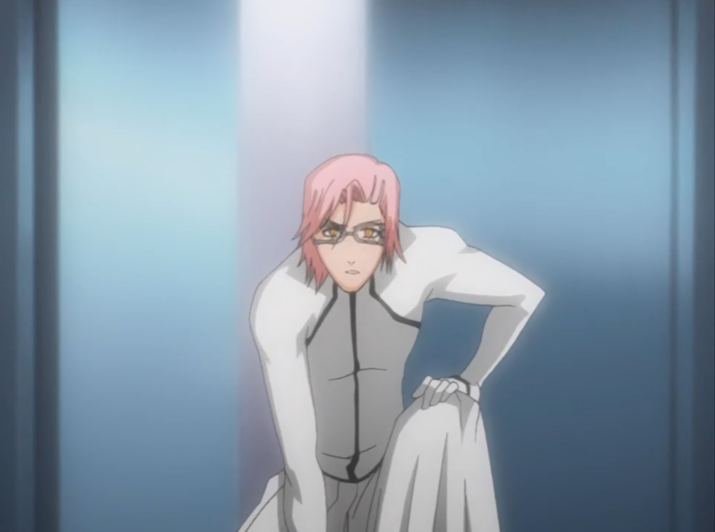
yôkoso
ようこそ : welcome
ex: Aizen à Orihime : « ようこそ warera no shiro, Las Noches : Bienvenue dans notre château Las Noches »
<=> ようこそ 我らの城 , Las Noches.
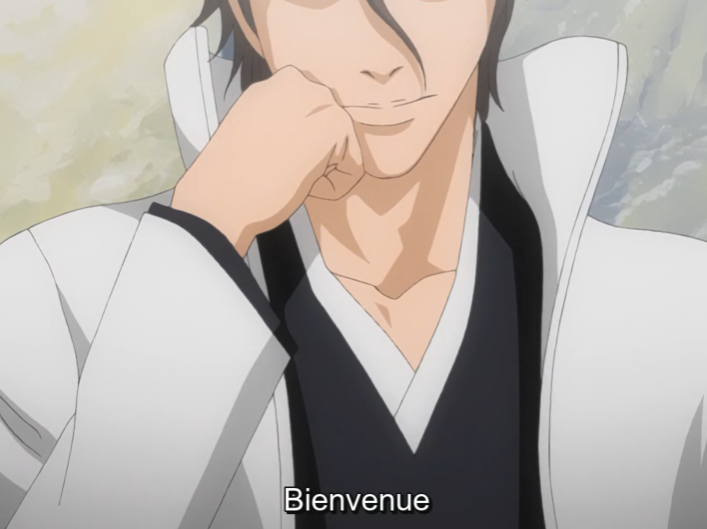
zan’nen
残念 : dommage
ex: Ulquiorra après s’être mangé un Getsuga Tensho d’Ichigo en Bankai Hollow: “Ima no ga zenryoku ka? Dōyara sōrashī na, 残念 da” <=> 今のが全力か?どうやらそうらしいな、残念だ. : C’était toute ta puissance là maintenant ? C’est dommage.
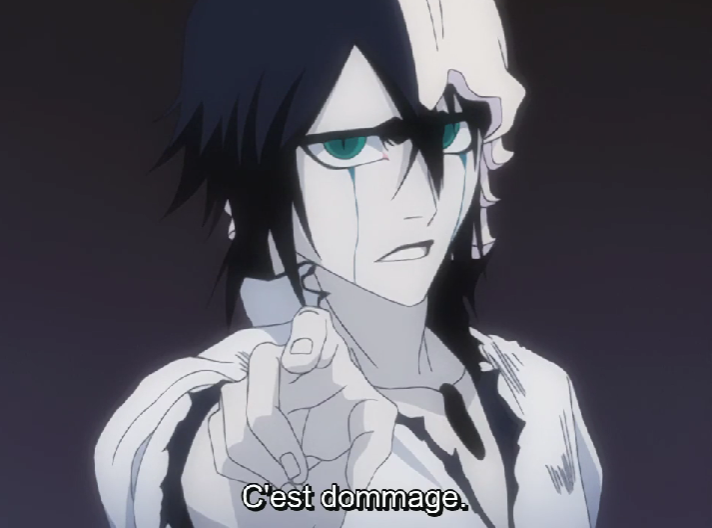
sasuga
(compliment) さすが ou 流石: As expected of you, just as I’d expect from you
ill: 副隊長 Aizen à son 隊長 Hirako qui l’a cramé en train de creep: “さすが desu.” : Impresionnant
ill: Aizen à Hirako Shinji qui dit à Hiyori que ça sert à rien qu’elle attaque Aizen: “流石. Omoiyari no fukai kotoba da, Hirako taichō.” <=> 流石、思いやりの深い言葉だ平子隊長 : Des paroles pleines de sagesse, capitaine Hirako.
ill: Dr Xeno à “Dr” Taiju qui comprend que Dr Xeno peut fabriquer des munitions à volonté: “さすが hanashi ga hayai ne Dr. Taiju“ <=> さすが話が早いねDr.大樹: Comme prévu, vous avez une vitesse de réponse, Dr Taiju.
ill: Tobi à propos d’Itachi qui a essayé de le tuer en implémentant Amaterasu dans l’œil gauche de Sasuke: “さすが Itachi da. Shinde nao odorokasareru.“ (Passive Plain Present Indicative Form) <=> さすがイタチだ。死んでなお驚かされる。: As expected of Itachi. Even in death, he continues to surprise me.
ill (adj): Tobi à propos d’Itachi qui a implanté Amaterasu dans l’œil de Sasuke: “さすが no Itachi ni mo, ore no subete wa shirarete inakatta. Denakereba, shinde ita.“ (Past Progressive negative form) <=> さすがのイタチにも、俺のすべては知られていなかった。でなければ、死んでいた。: Even the great Itachi didn't know everything about me. If he had, I would have died.
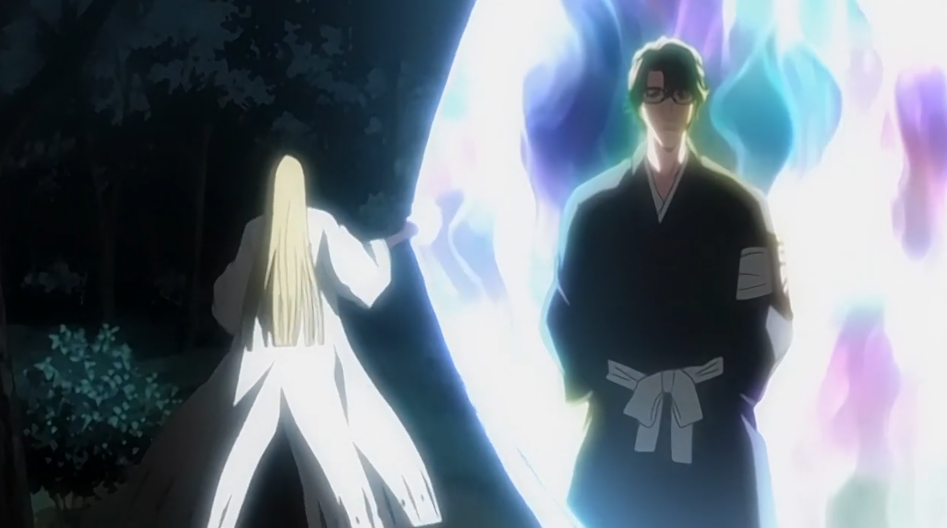
mochiron
もちろん : of course, naturally
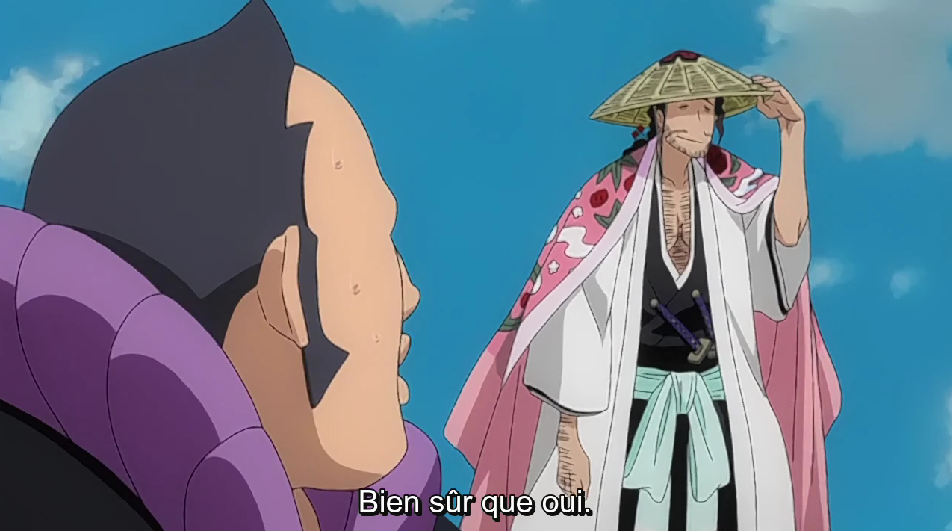
dômo
どうも: thanks
Version complète: どうもarigato (どうもありがとう)
=> Dire juste どうも est moins poli
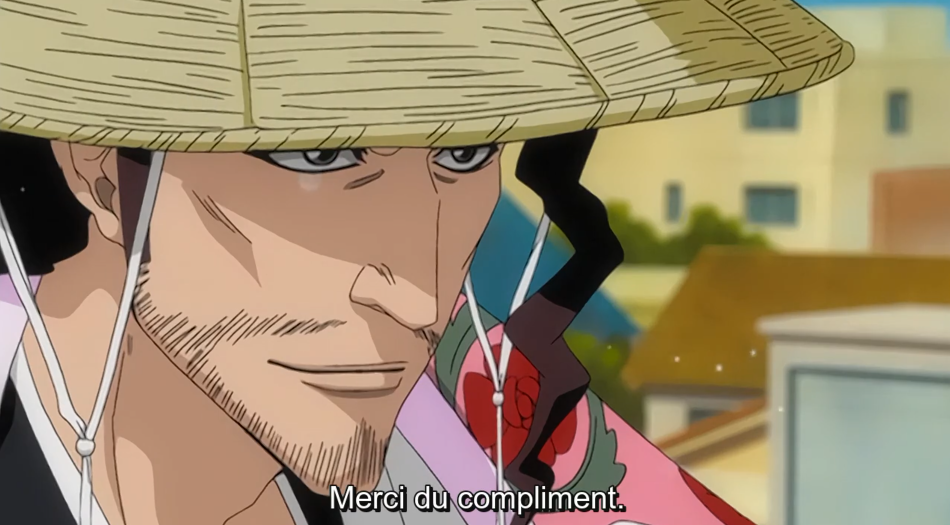
dôkan
同感 [どうかん] : agreement, same opinion, same feeling
ill: Tôsen à Gin qui dit que le monstre qui les libère des flammes a mauvaise haleine: “同感だな”
![<p><span>同感 [どうかん] : </span>agreement, same opinion, same feeling</p><p>ill: Tôsen à Gin qui dit que le monstre qui les libère des flammes a mauvaise haleine: “同感だな”</p>](https://knowt-user-attachments.s3.amazonaws.com/d19f096a-d350-4ec9-8a1f-c715ba23fcd1.png)
tashikani
確かに: certainly, admittedly, indeed, surely
ex: Byakuya à Ichigo: “Kisama no Zanpakuto no nôryoku 確かに takai. Daga…” : Je dois admettre que le pouvoir de ton Zanpakuto est redoutable. Cependant …
ex: Aizen about Hirako’s power: “確かに omoshiroi na. Subete ga gyakuda. Jōkasayū… zengo mo na” <=> 確かに面白いな。全てが逆だ。上下左右……前後もな: It's certainly interesting. Everything is upside down. Up and down, left and right... and front and back too.
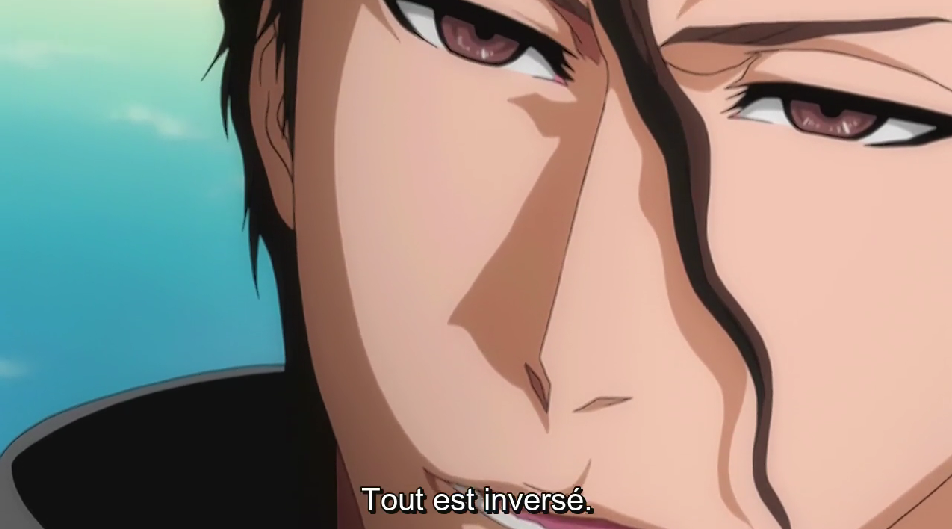
goran
ごらん: (please) try to (after the -te form of a verb)
ex: Aizen qui donne une 2nd chance à Ichigo qui avait raté son premier coup: “Utte ごらん. Sono kangae ga omoiagarida to oshieyou“ <=> 撃ってごらん。その考えが思い上がりだと教えよう: Please, attack me. I'll show you that your thinking is presumptuous.
ex: le Quincy Gremmy à Yachiru: “Sōzō shite goran moshi “kimi no ude no hone ga kukkīdatta to shitara”“ <=> 想像してごらんもし“君の腕の骨がクッキーだったとしたら”:: Try to imagine what if my arm bone was a cookie.
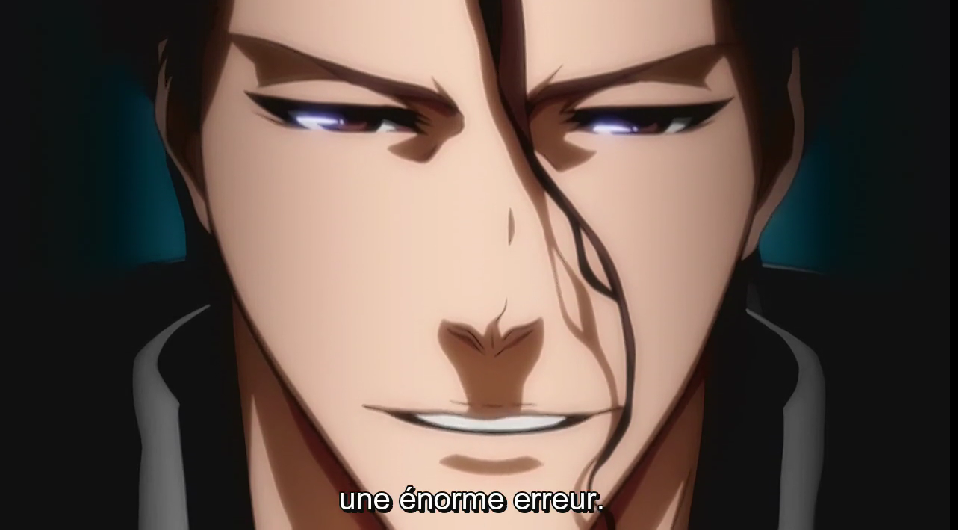
maji
(slang) マジ ou まじ: Seriously ?
ex: Ichigo quand les Zanpakutos de Matsumoto et Hinamori se disputent: “まじka yo?”
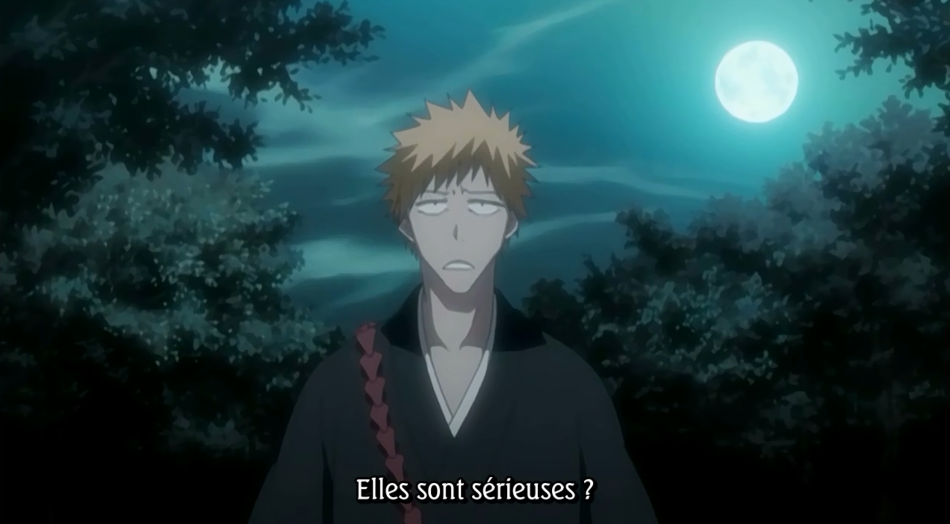
sakki
さっき: a short moment ago, just now
ill: Ichigo à Aizen: “Anta さっき itta yo na… ore ga… anta no tankyū no saikō no sozai ni naru to kakushin shite tatte… nandeda?” <=> あんたさっき言ったよな…俺が…あんたの探求の最高の素材になると確信してたって…何でだ?: Tout à l’heure tu as dit que… tu étais convaincu que j’étais le sujet parfait pour tes recherches. Pourquoi ?
ill: Itachi qui dit à Sasuke que Madara commençait à devenir aveugle à cause du Mangekyô: “さっき hanashita na. Kono me wa tokubetsu da to.“ <=> さっき話したな。この眼は特別だと。: Je l’ai dit tout à l’heure, non ? Ces yeux sont spéciaux. / I mentioned it earlier, didn’t I?
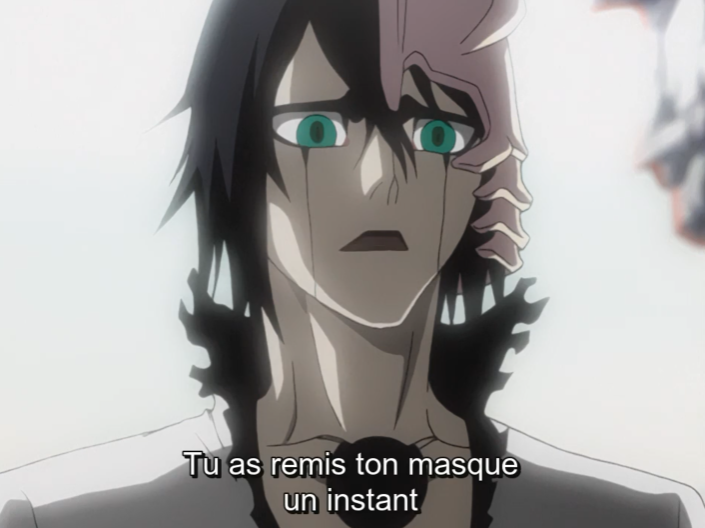
mattaku
全く ou まったく
(expression) Mazette ! , Good grief
(Used to express admiration, disbelief, or frustration)
ill: Aizen qui brille à Isshin et Ichigo: “全く, "Hōgyoku" to wa yoku nadzuketa mono da! Masashiku kore wa kami naru mono to kami narazaru mono to no majirawazaru chihei o kotogotoku uchikuzusu chikara da!!“ <=> 全く”崩玉”とはよく名付けたものだ!まさしくこれは神なるものと神ならざるものとの交わらざる地平を悉く打ち崩す力だ!!: Mazette, 'Hōgyoku' was well named! It is precisely a power that completely shatters the unmixed boundary between the divine and the non-divine!!
(adjectif/adverb) really; truly; entirely; completely; wholly; perfectly
ill: Itachi parlant de Madara qui devenait aveugle: “Kono me wa tokubetsu da to. Tsukaeba tsukau hodo fūin sare, ikitsuku saki wa まったく no yami.” (Passive stem form) <=> この眼は特別だと。使えば使うほど封印され、行き着く先はまったくの闇。: These eyes are special. The more you used them, the more they are sealed, and the destination they lead to is complete darkness.
ill: Aizen aux Vizards et capitaines: “Ukatsu ni chikadzukouga shinchō ni chikadzukouga, aru i wa まったく chikadzukazu tomo subete no ketsumatsu wa onaji koto” (Plain Presumptive Form; Formal Present Indicative Negative Form) <=> うかつに近付こうが慎重に近付こうが、或るいは全く近付かずとも全ての結末は同じ事 : Que vous vous approchiez avec négligence, prudence ou pas du tout, le résultat final est le même. [とも= without after neg verb]
![<p>全く ou まったく</p><ol><li><p>(expression) Mazette ! , Good grief</p><p>(Used to express admiration, disbelief, or frustration)</p><p>ill: Aizen qui brille à Isshin et Ichigo: “全く, "Hōgyoku" to wa yoku nadzuketa mono da! Masashiku kore wa kami naru mono to kami narazaru mono to no majirawazaru chihei o kotogotoku uchikuzusu chikara da!!“ <=> 全く”崩玉”とはよく名付けたものだ!まさしくこれは神なるものと神ならざるものとの交わらざる地平を悉く打ち崩す力だ!!: Mazette, 'Hōgyoku' was well named! It is precisely a power that completely shatters the unmixed boundary between the divine and the non-divine!!</p></li><li><p>(adjectif/adverb) really; truly; entirely; completely; wholly; perfectly</p><p>ill: Itachi parlant de Madara qui devenait aveugle: “Kono me wa tokubetsu da to. Tsukaeba tsukau hodo fūin <em>sare</em>, ikitsuku saki wa まったく no yami.” (<em>Passive stem form</em>) <=> この眼は特別だと。使えば使うほど封印され、行き着く先はまったくの闇。: These eyes are special. The more you used them, the more they are sealed, and the destination they lead to is complete darkness.</p><p>ill: Aizen aux Vizards et capitaines: “Ukatsu ni <em>chikadzukouga</em> shinchō ni <em>chikadzukouga</em>, aru i wa まったく <em>chikadzukazu</em> tomo subete no ketsumatsu wa onaji koto” (<em>Plain Presumptive Form</em>; <em>Formal Present Indicative Negative Form</em>) <=> うかつに近付こうが慎重に近付こうが、或るいは全く近付かずとも全ての結末は同じ事 : Que vous vous approchiez avec négligence, prudence ou pas du tout, le résultat final est le même. [とも= without after neg verb]</p></li></ol><p></p>](https://knowt-user-attachments.s3.amazonaws.com/6b269b81-61d1-4c77-9add-1865df6ff525.png)
naruhodo
なるほど ou 成程: I see, I understand
ex: le Quincy poli à Ichigo dans le Hueco Mundo
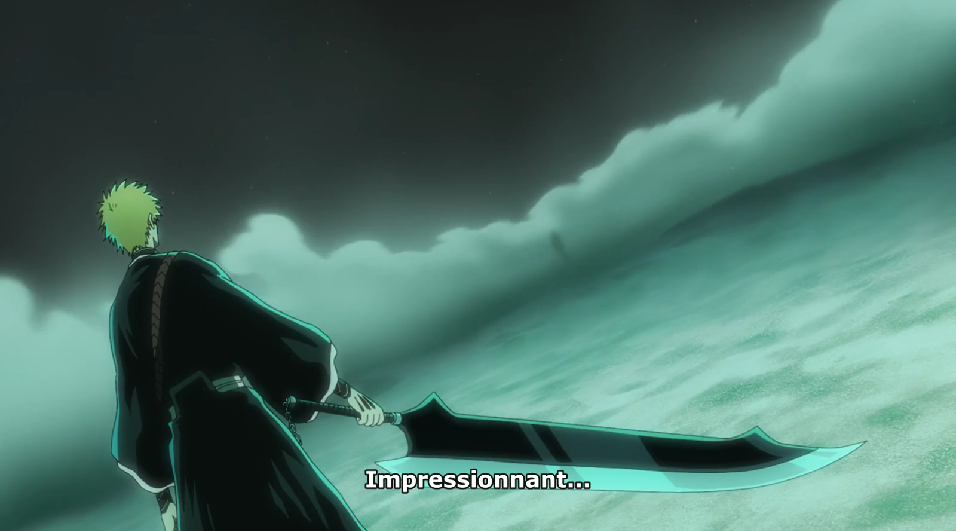
sô ieba
そういえば ou そう言いえば: speaking of which, now that you mention it; come to think of it; that reminds me
ex: Aizen après qu’Urahara ait utilisé une technique de Kido pour l''emprisonner: “そういえば Yamī no sentō kiroku ni sonna dōgu ga haitte ita na.“ <=> そういえばヤミーの戦闘記録にそんな道具が入っていたな。: Speaking of which, I remember (na) such tool (sonna dôgu) was included (haitte ita) in Yammy’s battle record/combat’s log.
[な (na) = Sentence-ending particle showing reflection or realization ]
ex: Ichigo qui demande à Grimmjow pourquoi il les aide (‘D’ailleurs, …’)
![<p>そういえば ou そう言いえば: speaking of which, now that you mention it; come to think of it; that reminds me</p><p>ex: Aizen après qu’Urahara ait utilisé une technique de Kido pour l''emprisonner: “そういえば Yamī no sentō kiroku ni sonna dōgu ga haitte ita na.“ <=> そういえばヤミーの戦闘記録にそんな道具が入っていたな。: Speaking of which, I remember (<em>na</em>) such tool (<em>sonna dôgu</em>) was included (<em>haitte ita</em>) in Yammy’s battle record/combat’s log.</p><p>[な (na) = Sentence-ending particle showing reflection or realization ]</p><p>ex: Ichigo qui demande à Grimmjow pourquoi il les aide (‘D’ailleurs, …’)</p>](https://knowt-user-attachments.s3.amazonaws.com/2e03f6d8-3922-441f-8945-b545ec96692b.png)
zan’nen nagara
残念ながら: unfortunately, I’m afraid to say; I’m sorry to say
ill: Aizen à Urahara après avoir survécu à son Kidô grâce au Hôgyoku: “Daga 残念ながら kimi no tsukuridashita Hôgyoku wa kimi no rikai o koete iru……“ <=> だが残念ながら 君の創り出した崩玉は君の理解を超えている……: But unfortunately, the Hôgyoku you created is beyond your understanding...
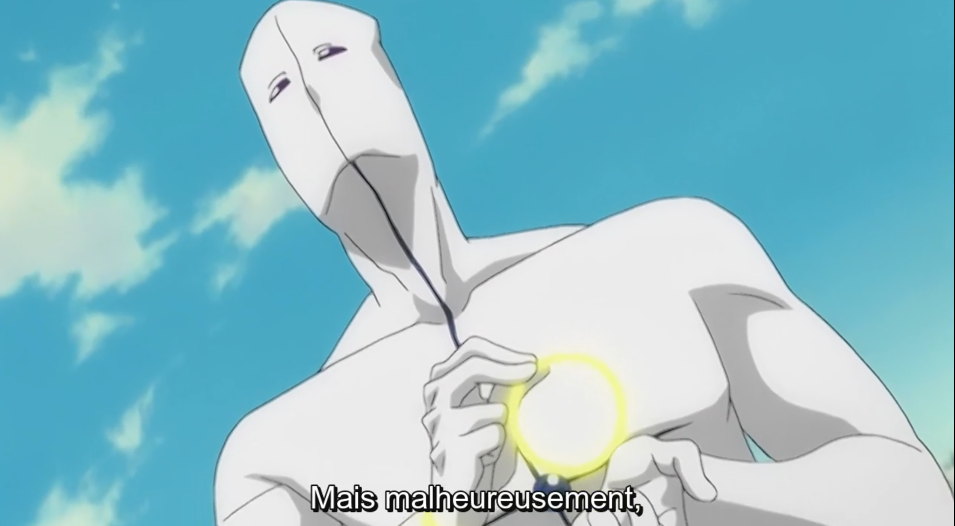
yaru
やる: (after -te form) casual / rough form of "to do / to give (to someone lower in status or an animal)"
ill: Aizen à Yamamoto qui lui dit que c’est cruel ce qu’il a fait à Wonderwice: “Mugoi? Hollow to natta tamashī ni imi nado nai. Tada itazura ni tamashī o kui asaru dake no sonzai da. Soko ni imi o ataete やる koto no nani ga mugoi to iu ndai?“ <=> 惨い? 虚となった魂に意味などない。ただ徒に魂を喰い漁るだけの存在だ。そこに意味を与えてやることの何が惨いと言うんだい?: Cruel? Une âme devenue hollow n’a aucun sens whatsoever. They’re just beings that only are on a soul-eating binge with no purpose. What's cruel about giving a meaning to it?
ill: Sasuke à Orochimaru: “Orochimaru. Anta wa ore yori yowai. Mō anta ni ore no karada o kurete やる hitsuyō mo nakunatta wake da.” <=> 大蛇丸。あんたは俺より弱い。もうあんたに俺の体をくれてやる必要もなくなったわけだ。: Orochimaru, you are weaker than me. The need for me to give (kureru) you my body is gone (nakunaru = to be lost, missing, to disappear).
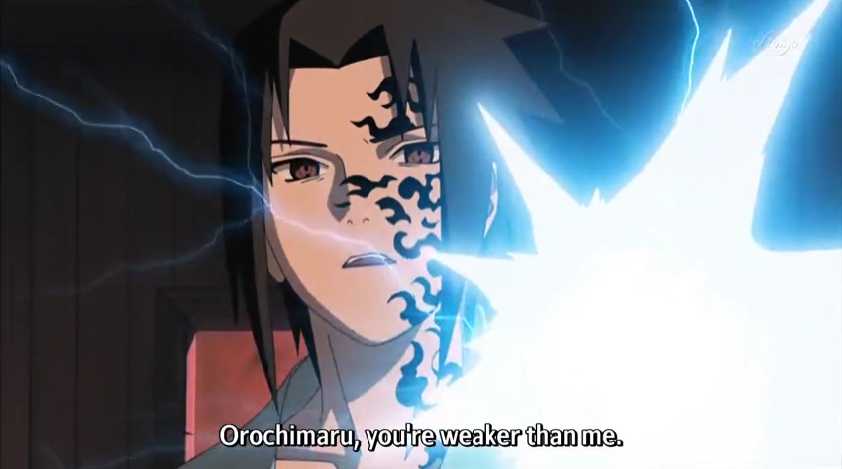
sugiru
すぎる ou 過ぎる: to be excessive; to be too much; to be too ... (often used after adj. stems or the -masu stems of verbs)
ill: Rukia qd elle apprend que les Espadas sont déjà sur Terre (bien avant décembre) : “Hayai すぎる” <=> 早いすぎる : That’s too early
ill: Nagato à Jiraya qui lui demande qu’est-ce qu’il a fait changé et où est passé Yahiko: “Koko de wa hito ga shiniすぎる. Sorera no itami ga ore o seichō saseta. Muchi de orokana kodomo mo, itami o shiru koto de hito e to seichō suru.“ <=> ここでは人が死にすぎる。それらの痛みが俺を成長させた。無知で愚かな子供も、痛みを知ることで人へと成長する。: Too many people die here. The pain of all that made me grow. Even ignorant, foolish children grow into people by experiencing pain.
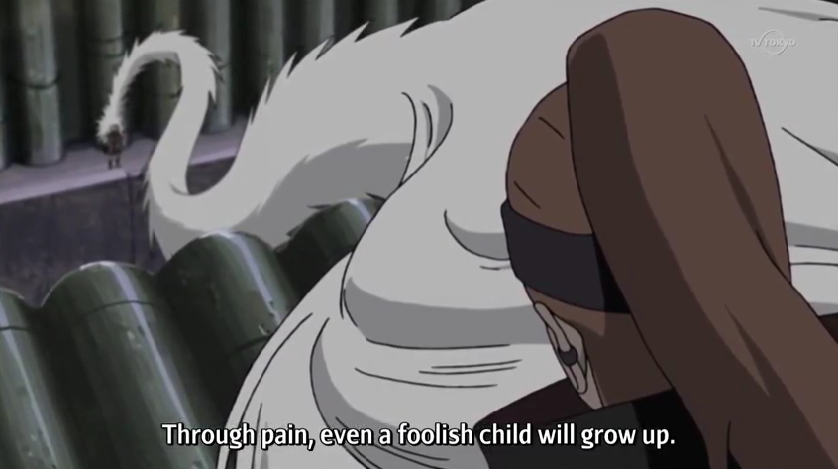
katsute
かつて: once, from the past, before, formerly, ever, former, ex-
More casual than 昔 Mukashi
ill: Kyûbi à Sasuke: “Sono dōryoku to, washi ijō ni magamagashii chakura… かつて no Uchiha Madara to onaji da na.” <=> その瞳力と、ワシ以上に禍々しいチャクラ…かつてのうちはマダラと同じだな。Those eye powers… and a chakra even more sinister than mine. You're just like the Uchiha Madara of the past.
ill: Kabuto à Naruto, Yamato et Hinata: “かつて boku-tachi no soshiki ga atsumeteta Akatsuki ni kansuru jōhō da yo.“ (Colloquial past progressive) <=> かつて僕たちの組織が集めてた暁に関する情報だよ。: This is information about the Akatsuki that our organization (soshiki) once/formerly/in the past (かつて) gathered (atsumeru).
ill: Itachi à Sasuke: “Madara ga shinde iru to iu no wa omae no kattena omoikomi da. かつて omae ga ore o yasashī ani da to omoikonde ita yō ni na.“ (Past Progressive) <=> マダラが死んでいるというのはお前の 勝手な思い込みだ 。 かつてお前が俺を優しい兄だと思い込んでいたようにな 。: Madara being dead was your own convenient assumption. Just like (ように) you were once convinced that I was a kind older brother.
ill: Itachi qui raconte à Sasuke l’histoire de Madara: “かつて Madara ni mo kyōdai ga ita.“ <=> かつてマダラにも兄弟がいた。: Autrefois, Madara aussi avait un frère.
ill: Ônoki à Madara et Kabuto: “Kono sensō wa chigau! かつて sensō de ubaiaatte kita mono to wa betsu no mono o, mina ga te ni ireru tame no tatakai ja ze.“ <=> この戦争は違う! かつて戦争で奪い合ってきたものとは別のものを、皆が手に入れるための戦いじゃぜ。: This war is different! Unlike (wa) the past wars where we took from each other, this is a battle for everyone to gain something different. [to = quotation marker, wa=contrast marker]
ill: Tobi à Naruto qui sait qu’il n’est pas Madara: “Nan’nara かつて no na Tobi demo ii zo. Sensō no hajimatta ima, namae nado dō demo ii. Madara, Tobi… suki ni yobe.” <=> なんならかつての名トビでもいいぞ。戦争の始まった今、名前などどうでもいい。マダラ、トビ、好きに呼べ。: If you want, you can even call me by [my] former name, Tobi. Now that the war has started, names and the likes do not matter. Madara, Tobi… Call me whatever you want.
![<p>かつて: once, from the past, before, formerly, ever, former, ex-</p><p>More casual than 昔 Mukashi</p><p>ill: Kyûbi à Sasuke: “Sono dōryoku to, washi ijō ni magamagashii chakura… かつて no Uchiha Madara to onaji da na.” <=> その瞳力と、ワシ以上に禍々しいチャクラ…かつてのうちはマダラと同じだな。Those eye powers… and a chakra even more sinister than mine. You're just like the Uchiha Madara of the past.</p><p>ill: Kabuto à Naruto, Yamato et Hinata: “かつて boku-tachi no soshiki ga <em>atsumeteta</em> Akatsuki ni kansuru jōhō da yo.“ (<em>Colloquial past progressive</em>) <=> かつて僕たちの組織が集めてた暁に関する情報だよ。: This is information about the Akatsuki that our organization (<em>soshiki</em>) once/formerly/in the past (かつて) gathered (<em>atsumeru</em>).</p><p>ill: Itachi à Sasuke: “Madara ga shinde iru to iu no wa omae no kattena omoikomi da. かつて omae ga ore o yasashī ani da to <em>omoikonde ita</em> yō ni na.“ (<em>Past Progressive</em>) <=> マダラが死んでいるというのはお前の 勝手な思い込みだ 。 かつてお前が俺を優しい兄だと思い込んでいたようにな 。: Madara being dead was your own convenient assumption. Just like (ように) you were once convinced that I was a kind older brother.</p><p>ill: Itachi qui raconte à Sasuke l’histoire de Madara: “かつて Madara ni mo kyōdai ga ita.“ <=> かつてマダラにも兄弟がいた。: Autrefois, Madara aussi avait un frère.</p><p>ill: Ônoki à Madara et Kabuto: “Kono sensō wa chigau! かつて sensō de ubaiaatte kita mono to wa betsu no mono o, mina ga te ni ireru tame no tatakai ja ze.“ <=> この戦争は違う! かつて戦争で奪い合ってきたものとは別のものを、皆が手に入れるための戦いじゃぜ。: This war is different! Unlike (<em>wa</em>) the past wars where we took from each other, this is a battle for everyone to gain something different. [to = quotation marker, wa=contrast marker]</p><p>ill: Tobi à Naruto qui sait qu’il n’est pas Madara: “Nan’nara かつて no na Tobi demo ii zo. Sensō no hajimatta ima, namae nado dō demo ii. Madara, Tobi… suki ni yobe.” <=> なんならかつての名トビでもいいぞ。戦争の始まった今、名前などどうでもいい。マダラ、トビ、好きに呼べ。: If you want, you can even call me by [my] former name, Tobi. Now that the war has started, names and the likes do not matter. Madara, Tobi… Call me whatever you want.</p>](https://knowt-user-attachments.s3.amazonaws.com/128582ca-549a-4249-a84b-d6b614481648.png)
Me ni wa me o.
(Saying) “目には目を”: an eye for an eye
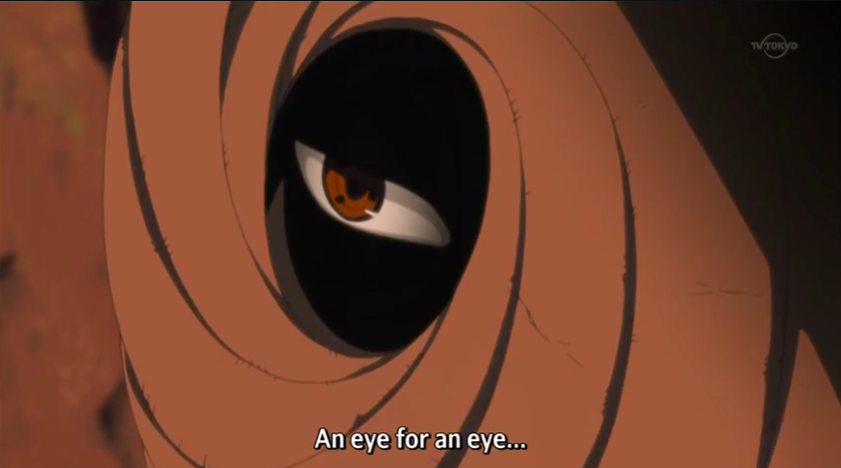
Jijitsu wa shōsetsu yori ki nari.
(Saying) “事実は小説より奇なり”: Truth is stranger than fiction
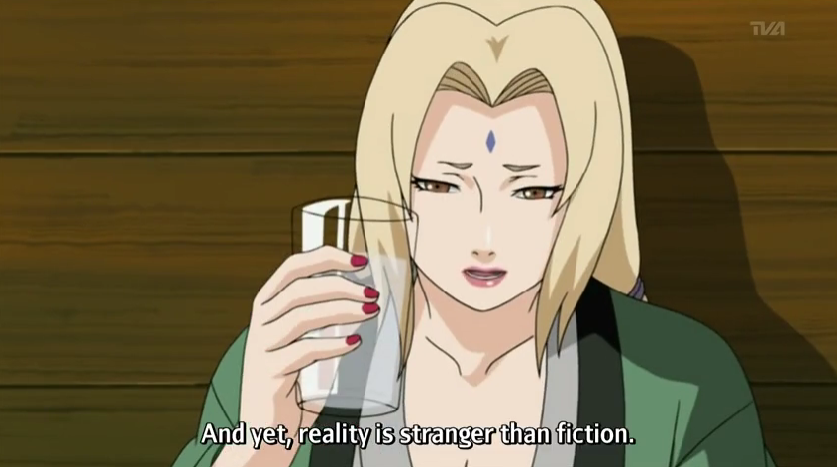
Kyô no tomo wa asu no teki kamoshirenai.
(Saying) 今日の友は明日の敵かもしれない: L’ami d’aujourd’hui pourrait être l’ennemi de demain.
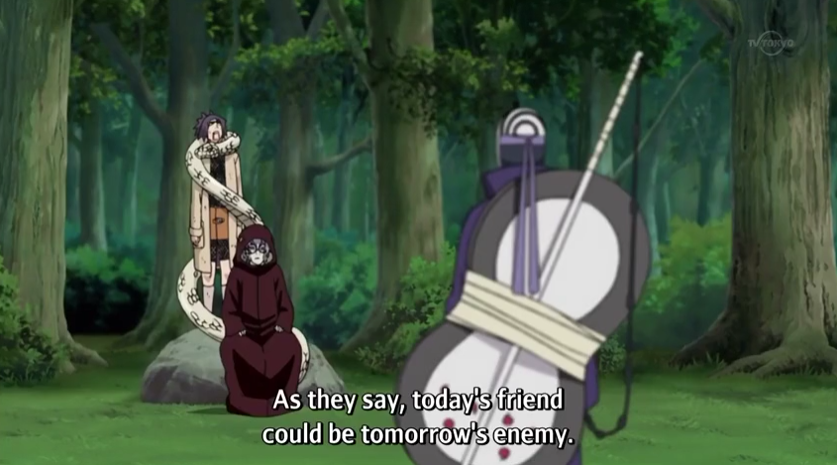
Chinmoku wa kin, yūben wa gin.
(Saying) 沈黙は金、雄弁は銀: Le silence est d’or, l’éloquence est d’argent.
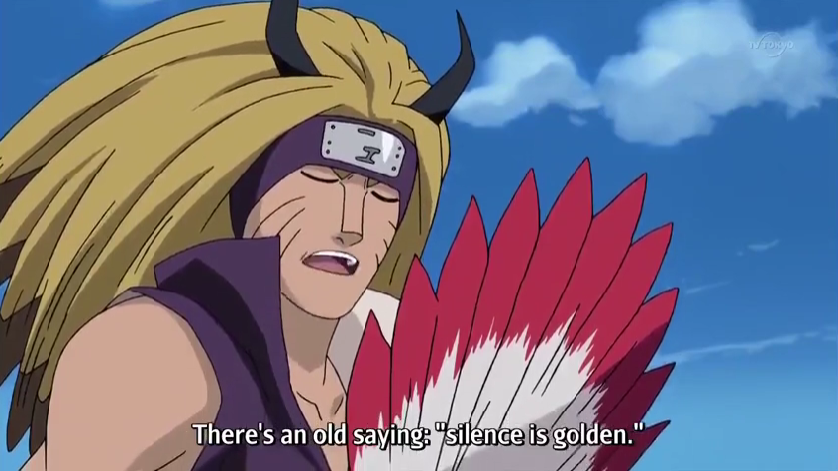
Teki no teki wa mikata.
(Saying) 敵の敵は味方: the enemy of my enemy is my friend
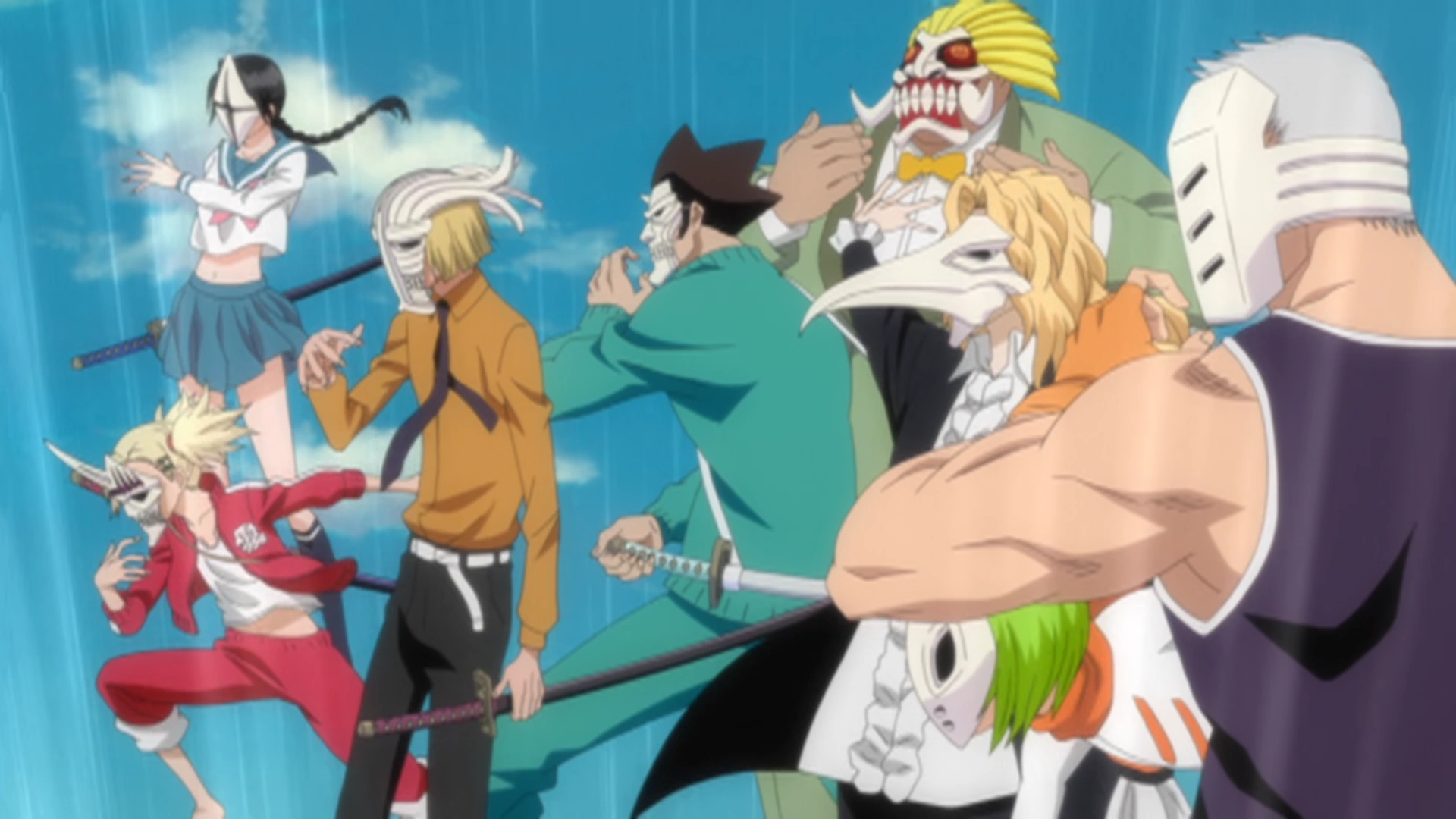
Doitsu mo koitsu mo.
(Expression) どいつもこいつも: every last one of them is incompetent, Y en a pas un pour rattraper l’autre
ill: Quand Madara apprend que Nagato a utilisé le Rinne Tensei 輪廻転生 sur les villageois de Konoah plutôt que sur lui
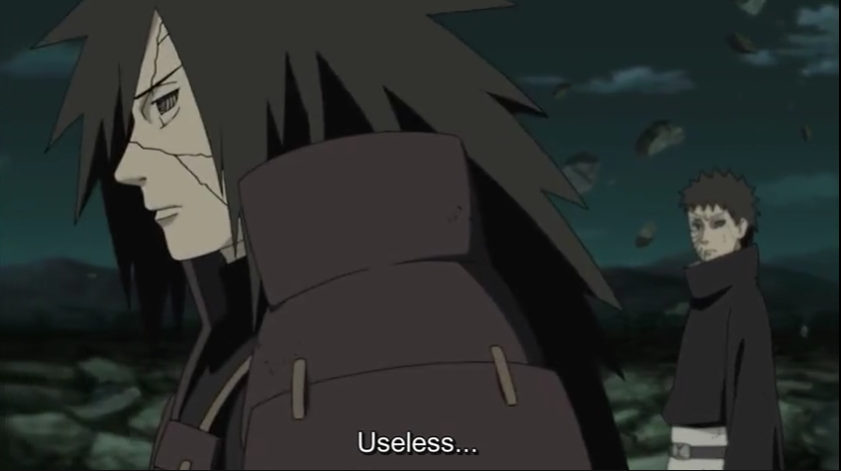
Dô demo ii.
どうでもいい: it doesn’t matter
ill: Tobi à Naruto qui sait qu’il n’est pas Madara: “Nan’nara katsute no na Tobi demo ii zo. Sensō no hajimatta ima, namae nado どうでもいい. Madara, Tobi… suki ni yobe.” <=> なんならかつての名トビでもいいぞ。戦争の始まった今、名前などどうでもいい。マダラ、トビ、好きに呼べ。: If you want, you can even call me by [my] former name, Tobi. Now that the war has started, names and the likes do not matter.
![<p>どうでもいい: it doesn’t matter</p><p>ill: Tobi à Naruto qui sait qu’il n’est pas Madara: “Nan’nara katsute no na Tobi demo ii zo. Sensō no hajimatta ima, namae nado どうでもいい. Madara, Tobi… suki ni yobe.” <=> なんならかつての名トビでもいいぞ。戦争の始まった今、名前などどうでもいい。マダラ、トビ、好きに呼べ。: If you want, you can even call me by [my] former name, Tobi. Now that the war has started, names and the likes do not matter.</p>](https://knowt-user-attachments.s3.amazonaws.com/675e22e1-d9de-4729-acbb-e0fb1b12cae0.png)